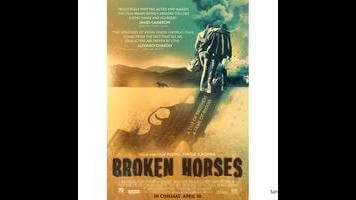As Sean Penn is no doubt well aware, foreign directors have come to Hollywood since the earliest days of cinema—from F.W. Murnau to Alejandro González Iñárritu, it’s been a long procession of sonofabitches with green cards. Curiously, however, there have been no notable émigrés from the Bollywood film industry, which ranks among the world’s largest. Vidhu Vinod Chopra, who’s worked in Bollywood since the 1970s, would clearly like to change that, but his English-language debut, Broken Horses, doesn’t inspire much confidence. Very loosely inspired by Chopra’s 1989 feature Parinda, this wan crime drama plays like the equivalent of a Hindi novel that’s been run through Google Translate. Everything feels rudimentary and slightly awkward, though it’s possible to discern how the material might once have been powerful.
Right off the bat, Chopra has trouble establishing the correct tone. A prologue set 15 years ago introduces two small-town brothers, both still kids: Buddy (Henry Shotwell) and Jakey (Nicholas Neve). Buddy is the older of the two, but Shotwell’s weirdly stilted performance makes him come across like a robot butler in training, whereas Jakey, a violin prodigy, barely speaks. Only when the film jumps to the present day does it finally become clear that Buddy (now played by Chris Marquette) is mentally impaired to some degree, which makes him susceptible to the manipulations of town enforcer Julius Hench (Vincent D’Onofrio). The adult Jakey (Anton Yelchin), meanwhile, who’s surprisingly neurotypical given his mute childhood, has long since moved to New York, where he has a fiancée (María Valverde) and a budding musical career. When Buddy invites Jakey home to give him a special wedding present, however, Jakey finds himself targeted by Hench, who fears that little brother means to take Buddy away from him.
Since Hench is surrounded by literal Hench-men at all times, it beggars credulity that he’d commit murder in order to retain Buddy’s services—there’s only so much utility to a thug who’s too feeble-minded to understand what’s being asked of him. But, then, very little of Broken Horses makes a whole lot of sense. Jakey, after arriving in his dusty hometown near the Mexican border, refuses to answer his phone or return any of his fiancée’s messages, for no apparent reason except that the script requires her to kick-start act three by showing up in person to look for him. When Hench wants to target a rival drug runner (Jordi Caballero), Jakey’s allegedly brilliant plan is to pose as a reporter for New York University’s school newspaper and interview him about his criminal empire. (Did Chopra get notes from an NYU film student? Is this the weirdest product placement of all time? Truly bewildering.) All of the actors seem lost, and while there are occasional groundswells of raw emotion, the context renders them more goofy than cathartic. Chopra’s amalgam of the earnest and the ridiculous might have worked as a Bollywood movie; transplanted to America (and stripped of musical numbers), it just seems, well, earnest and ridiculous.









































